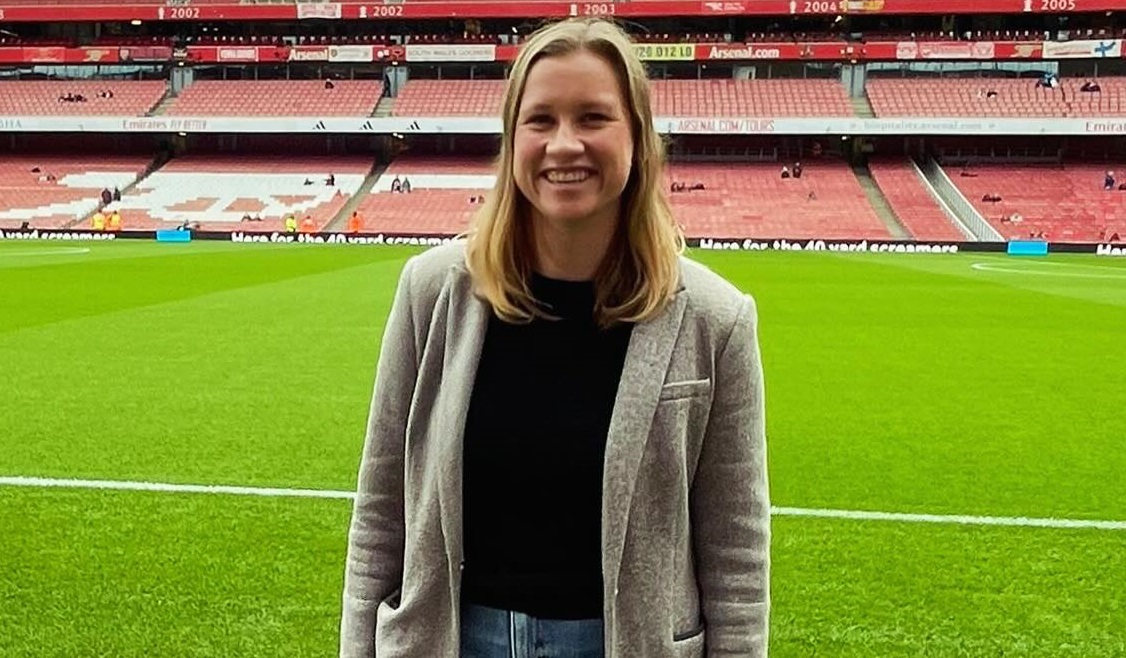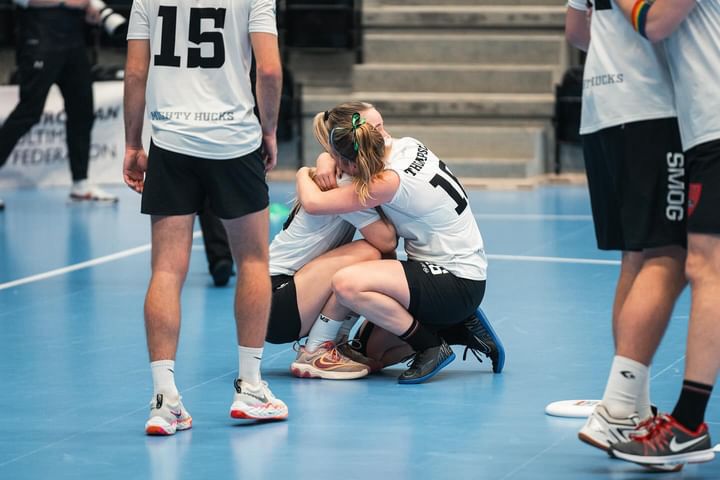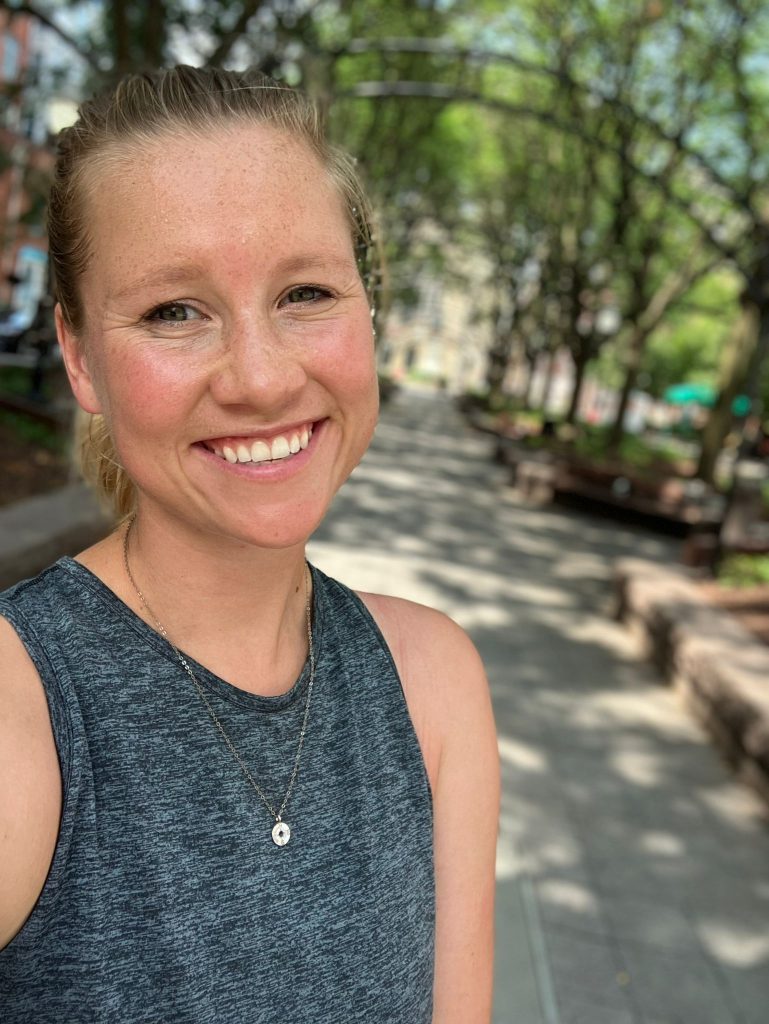‘My own journey inspires me to cover LGBTQ+ athletes’: Sky Sports’ Becky Thompson Q&A for International Women’s Day
From interviewing trans athletes for the Telegraph and CNN, to fronting an LGBT+ History Month video for Sky’s WSL TikTok account, Becky Thompson is telling important stories at a time when women in sport face a high risk of abuse on social media; to mark IWD 2024 and its #InspireInclusion theme, she talks about the icons she admires, her Ultimate Frisbee passion, being pan, and the advice she got from an industry great…

After an apology for being out of breath – “I’ve just run up the stairs!” – Becky Thompson gets ready to tackle our latest Sports Media LGBT+ Q&A.
We’ve done well just to catch up with her. As an international sportswoman who had already built up considerable industry experience before recently launching herself into the helter-skelter world of Sky Sports social media, she can regularly be found bursting with energy and enthusiasm.
Her portfolio features several examples of impactful content on major platforms that have amplified LGBTQ+ voices in a way that encourages others to get out there, whether as an active participant or as an influential storyteller.
So with the theme of International Women’s Day 2024 being #InspireInclusion, we reached out to Becky to find out more about her motivation and where she draws her strength.
Over to you, Becky…
Hi Becky! Thanks for joining us for a chat. You’ve been part of the team at Sky Sports for a couple of months now. Can you tell us about your role?
I’m a social media journalist. I work primarily on the football team, covering EFL, WSL and Premier League, and then I help out with news as well.
What that looks like is anything from publishing content that’s gone out across Sky Sports News, to creating our own bespoke and social-first content, and trying to get journalism and stories out to a different generation. I enjoy the work, it’s been really fun!
We’ve invited you for this Q&A to tie in with International Women’s Day – and March is also Women’s History Month. The IWD theme this year is ‘Inspire Inclusion’. Who are the women in sports history who inspire you?
There are several! There are the ones you might expect to hear, such as Serena Williams and everything she’s achieved, and Venus Williams as well. I’ve always loved watching them play and following all that they’ve gone through, to get to where they are.
Having grown up watching football, I continue to be in love with Christine Sinclair. She’s been an absolute inspiration and a role model not just for Canadians, but for women playing football all over the world.
Watching her compete from such a young age, for as many years as she did until now when she’s just retired from the national team, has been incredible. To stay that good for so long, it shows such great determination and passion for the game. That passion has always inspired me.
I’ve always looked up to people like Megan Rapinoe as well, those who are superb advocates within the LGBTQ+ community who use their voices to foster inclusion inside and outside of their sports.
Since you moved over to the UK from Canada five years ago, you’ve centered inclusion in sport in a lot of your journalism. Why is that so important to you and which stories from your porfolio best reflect that?
There was a period of time during which I didn’t realise just how important inclusion was to me or why it was so important. It was always something I cared about and was passionate about, but I hadn’t fully clued into that until I figured myself out a little bit more.
Firstly, I truly believe sport is a place where inclusion, politics, gender, race etc, go together. Sport is an international language, and if we can communicate these “issues” through it, maybe they could stop being viewed as issues.
Sport also offers a beautiful way to tell stories, in a way that connects with people who may not read those stories otherwise.
I did a TikTok video for Sky the other week on the top three LGBTQ+ moments in women’s football. It’s quickly become one of my personal favourites – it was on our Sky Sports WSL account which had never covered an LGBTQ+ story before, and it put it into the stream or eyeline of so many people who wouldn’t have otherwise seen that kind of content. I just think that’s so cool.
Through the work you’ve done, you’ve built a strong reputation for LGBTQ+ storytelling and helping athletes share their experiences, including trans athletes. What have you learned from producing this type of content?
My work with trans athletes is definitely some of the most important that I’ve done, in particular a cycling story that I did with Natalie van Gogh for Telegraph Women’s Sport. It got people to have more conversations around the topic, which I’m proud about.
I’ve certainly learned that it’s an incredibly challenging and complex topic, one that’s very difficult to cover in terms of balance.
It’s so important to have trans voices heard in the conversation. Aside from the scientific reasons for competing or not competing, we can’t forget the human side of the story. Trans athletes are people like everybody else – if I want to play sport, why wouldn’t they want to play sport?
Yes, there’s a conversation to be had around rules and regulations but I’ve learned so much about the human side of storytelling and how to get that across in articles around inclusion.
You also play at an elite level in a very inclusive sport, which is ultimate frisbee. How did that become your sport of choice? Tell us your career highlights so far and your future ambitions!
I’m so lucky to play in a sport that is so inclusive – that’s something I love so much about it.
When I first started, I’d spent time in my elementary school playing sport with all the boys at lunch just because I liked it, and then I went to an all girls high school.
I hated it and I found out that the ultimate frisbee team was with the all boys school, so I joined the team because I just wanted to play sport with boys. It was fun and I like to play in the mud!
I played football throughout high school and university as well, and loved it, but I eventually came back to frisbee because of the community. The people, the friends, the inclusivity, the passion… it’s everything that I’ve always wanted and not to say that there isn’t that in other sports, but I really found my people within frisbee.

They understood me being a bit quirky and weird! We were all kind of like that together but still with a drive to compete. That’s special and it’s why ultimate became my sport of choice.
In terms of career highlights, I won bronze with the Canadian Under-24 team in 2018, when I was captain of the team at the World Championships. That was an amazing experience, to come home with a medal.
More recently, I was at the Indoor European Club Championships in Denmark at the start of February and we won gold there, which was truly spectacular. It was my first European title.
I’ll never forget those moments. It sounds soppy, but the best part was the moments where we’re all hugging each other after and you’ve done it with your closest friends, all people you really care about. I’m very lucky to play the sport that I do.
You’ve been super supportive of Sports Media LGBT+ which we appreciate very much! The network has always existed to help people feel more connected, acknowledged and authentic. How has your journey been in an LGBTQ+ context, if you’re OK to share?
In all honesty, I’m still evolving in that regard. I’m learning a lot about myself.
I’m pansexual. I’ve always loved people and been attracted to personalities and human connection – if I click with someone, I really click with them.

I’ve struggled to talk about it at times because my partner is male, and heterosexual, and for a lot of people from the outside looking in, it looks like I’m in a heteronormative relationship.
I definitely internalise that sometimes and although I haven’t always been as open as I could have been with it, I am who I am, and I love who I am.
I touched on it earlier when we talked about why LGBTQ+ stories are so important to me. Figuring out that part of me and my identity has really shed a light on why I’m so passionate about it. I want voices like mine and those of others who are LGBTQ+ in sports media to be out there too.
There should be as many of us producing content and writing stories as anyone else, and I feel we’re slowly getting to that point where it doesn’t have to be highlighted in a ‘big deal’ sort of way.
I think Sky’s doing a good job of that and I really appreciate the Sports Media LGBT+ community. I’ve learned a lot even from just reading messages in our WhatsApp group, and I admire everybody in there for being their authentic selves.
The more I see that, the more it helps me to be more open about who I am as well.
You mentioned the Sky Sports WSL TikTok post that you worked on for LGBT+ History Month. That got some good engagement, and interesting responses! What is your objective with a post like that?
The objective was to help that kind of conversation become more ‘usualised’, in a sense, and for it to exist in a sports media space where it isn’t often highlighted.
And to truly celebrate not just LGBT+ History Month, but also the amazing inclusivity of women’s football and all those players who are advocating for inclusion.
That TikTok channel is a platform where those kinds of stories haven’t necessarily been covered before and hopefully this will be the start of many more things like it.
Social media can be quite an unpleasant place these days, especially for a woman in sport who writes about inclusion. I recall you’ve had run-ins with some prominent figures who take an opposing view! Any advice for people who find themselves in similar situations?
It can be so challenging, especially as a woman in the industry and someone who writes about inclusion and difficult subjects. There’s an element of having to let it blow by you like the wind which is something my partner always advises me to do. I’m sometimes good at that, sometimes not!
The best advice I was ever given was by Darren Lewis, from the Mirror, CNN and Sky Sports News. I’ll never forget him telling me that if you’re not getting negative comments, you’re doing something wrong.
Now obviously there’s a balance with that and being targeted on social media is pretty horrible. But at the same time, it means you’ve reached an audience who doesn’t agree with you, and I think that’s really important in journalism, and that’s really helped me in how I reflect on it.
The fact that those stories haven’t existed in an echo chamber is incredible. So that would be my advice, to remember that if someone has something negative to say, you’ve reached people who would never have otherwise read it.
Some won’t have read it and will just be reacting on social media, and then you just have to ignore it, mute it, turn off your notifications or even boot the app for two or three days, as I’ve done before.
But to have that kind of reaction, you’re truly making an impact.
Despite the drawbacks, social media is still largely a fun and useful place to be (after all, most of us are still on Twitter, despite everything!) If you could change one thing to make it more positive, what would it be?
It’s a really hard question to answer! I think we all talk about having better verification and making sure that it’s real people using the apps, especially X or Twitter, because of how many bots are on the platform. If you have real verification, you can also then have accountability for when people do say horrible, racist or homophobic things on the platforms.
I think we have to keep fighting for social media. It’s a wonderful tool and I love it. My whole job is around social media now and I’ve been really inspired by working in it and seeing how many people you can reach and what you can do with it.
I don’t think I’d change how much we use it, but I’d definitely change how people interact on it. I think that’s on the platforms to do that.
Thanks for answering these Qs! Anything we haven’t spoken about that you’d be keen to mention… maybe a closing thought for IWD?
Thank you! We talk so much about the importance of equity for women, particularly when International Women’s Day arrives in the calendar. We need the same for the LGBTQ+ community as well, and for people of colour. So there’s so much more work to do.
A lot of places are starting to do better, but I think getting more articles, social media posts, TV pieces etc about inclusion into the mainstream media helps change perceptions.
The more these stories are out there, the less people will flinch when they see them. If they’re getting upset about them, it’s because they’re just not used to seeing it. It’s different, and people are always scared of what they don’t know.
The more we can help educate people, the better.
Thank you to Becky for the Q&A and for all the great work! You can find her on Twitter / X and Instagram.
For more of Our Stories in Sport, check out our content archive. You can also reach out to us in confidence through a DM on social media or on email.
Sports Media LGBT+ is a network, advocacy, and consultancy group that is helping to build a community of LGBTQ+ people and allies in sport. We’re also a digital publisher and can help with your content requirements. Learn more about us here.
We’re interested in your news and stories. Share with us and tap into a worldwide audience through our Google News affiliate website which attracts thousands of visitors, and our popular social channels. Contact us to discuss how we can help you.


